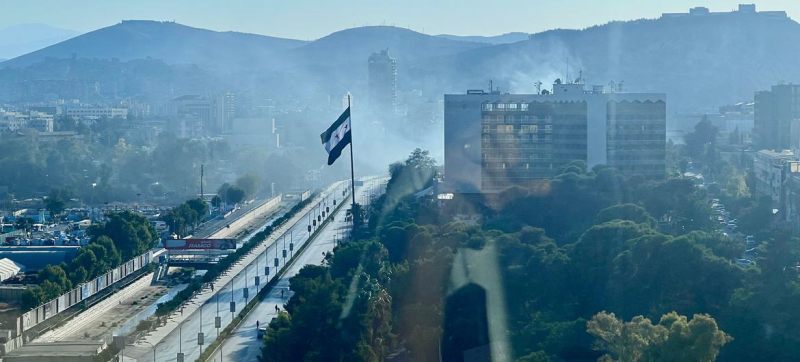- UN Report Calls for New Thinking to Secure a Sustainable Future |
- BNP moves to finalise seat sharing as alliance friction grows |
- BNP plans universal 'Family Card' for all women: Tarique Rahman |
- Tangail saree weaving gets recognition as intangible cultural heritage |
- Chuadanga farmers thrive as cauliflower yields hit new high |
Repeated Violence Threatens Syria’s Rebuilding, UN Investigator Warns

smoke from bombed Ministry of Defence building in Damascus (July 2025)
Incidents of mass killings and torture in post-Assad Syria are tempering early optimism about the transitional government’s ability to end entrenched cycles of violence, the head of the UN-mandated independent investigative body on Syria said on Thursday.
In December 2024, the Bashar Al-Assad regime was toppled by a coalition of opposition groups, led by the Hay'at Tahrir al-Sham militia, leading to widespread relief that the civil war, which lasted over a decade, had ended — signalling the return of over a million Syrian refugees.
After being shut out of the country during the Assad years, the Independent International Commission of Inquiry on Syria — appointed by the UN Human Rights Council in 2011 to investigate and document human rights violations during the conflict — was granted full access by the transitional government of President Ahmed al-Sharaa.
In August, the Commission released a report on the wave of violence that engulfed coastal and western central Syria from January 2025, which found that acts potentially amounting to war crimes, including murder and torture, had been committed.
Massacres in Latakia and beyond
An estimated 1,400 men, women, and children were killed in massacres in Latakia, Tartus, and Hama governorates, including by members of the government’s security forces.
Updating the Third Committee of the General Assembly — which focuses on human rights issues — on Thursday, Mr Pinheiro said investigators conducted on-site visits to Latakia and Tartus in June, and more recently to Suweyda and surrounding areas.
He reported that his team continues to receive reports of extra-judicial killings, torture, ill-treatment, and the forced displacement of Alawi civilians in Damascus and western governorates.
In Sweida, more than 30 villages in predominantly Druze areas have been entirely depopulated, looted, and burned. Commission investigators met many families and witnesses who recounted the brutal killings of loved ones taken from their homes.
Stage set for further violence
“There is growing mistrust between the Druze and Bedouin communities and the interim government, which needs to hold perpetrators accountable and ensure such acts are never repeated,” Mr Pinheiro said.
“The Commission is gravely concerned that the stage is set for further violence if swift action is not taken. Rebuilding trust will require dedicated efforts for dialogue, inclusion, and justice for all victims.”
The UN-appointed independent rights expert also raised concerns about violence and discrimination against women, citing multiple reports of women and girls being abducted by unknown armed actors, some of whom were reportedly subjected to sexual violence and forced marriage.
“In many cases, despite reporting their disappearance to local authorities, families report that no action has been taken to investigate or follow up,” he said.
Mr Pinheiro called on UN Member States to halt Israel’s advance into southern Syria, which has reportedly caused civilian casualties, forced displacement, and arbitrary detentions: “Third-state intervention risks further inflaming the conflict and inflicting even greater suffering on the Syrian people.”
Noting recent steps by several States and the EU to ease sanctions on Syria, Mr Pinheiro welcomed such moves and urged Member States to continue supporting the 2025 humanitarian appeal for the country, which is currently only 19 percent funded.

